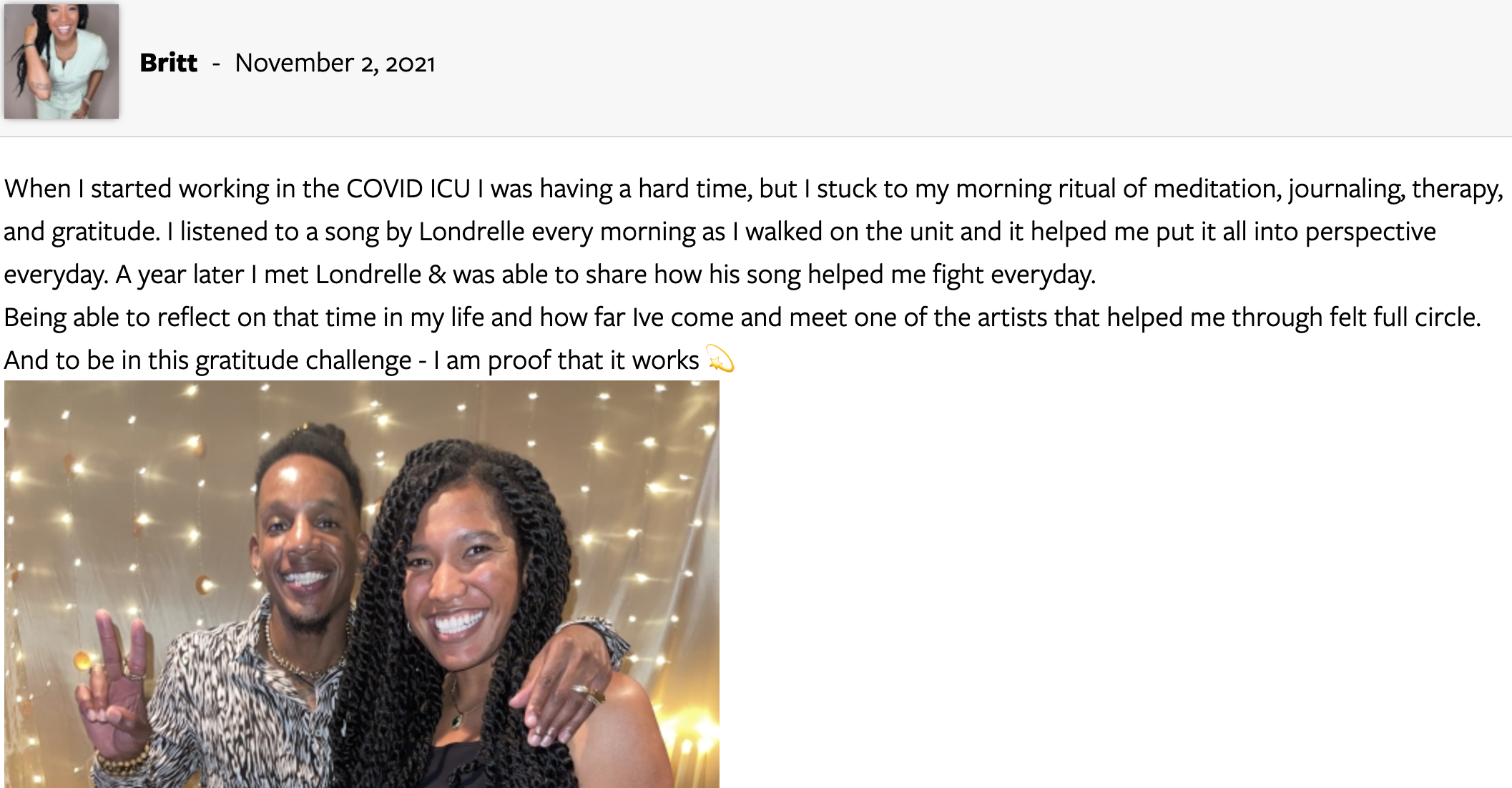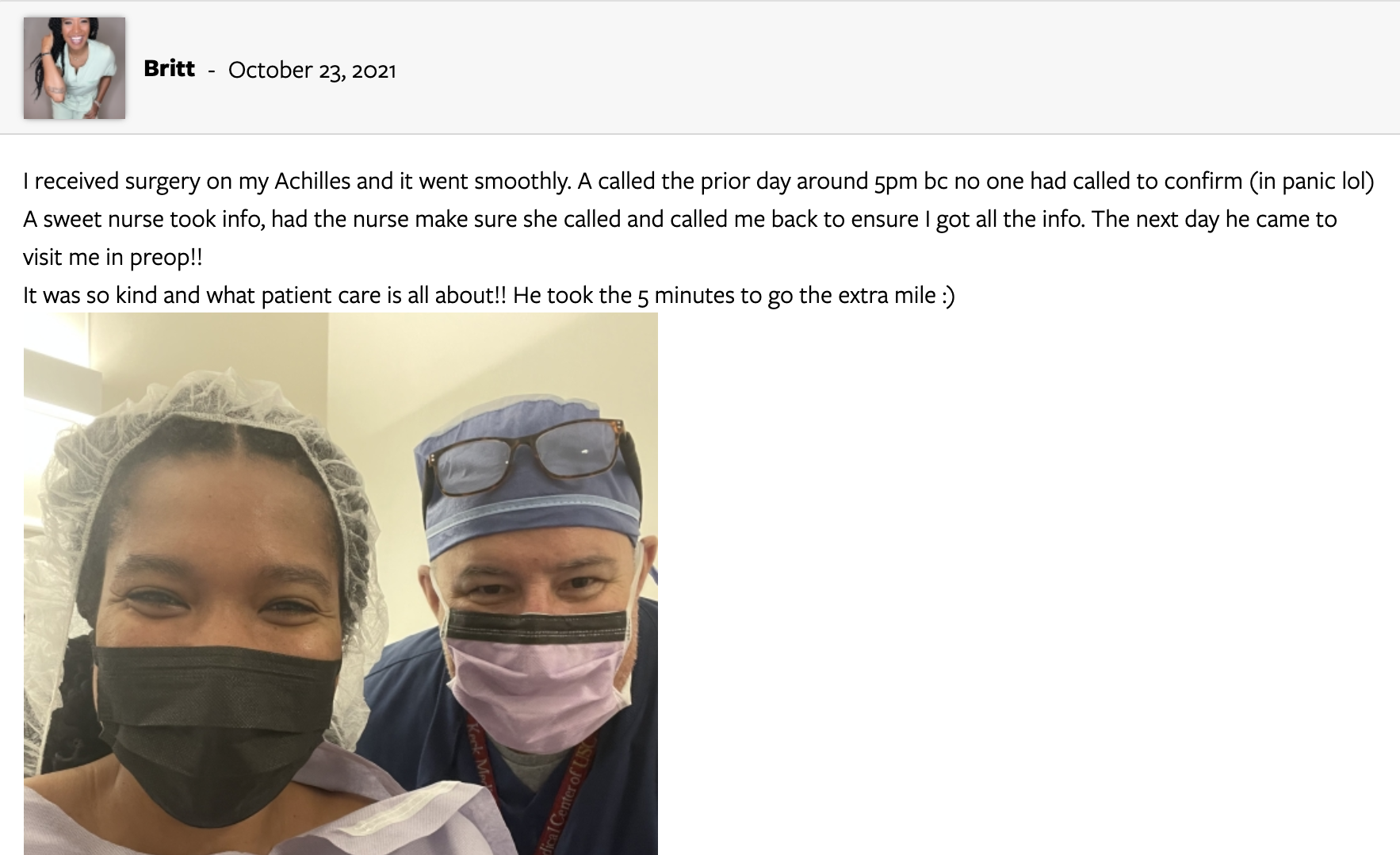Each time nurse Britt Greaves walked into the COVID-19 intensive care unit for her shift, machines beeping all around her, her anxiety would spike. So she developed a habit: She would pop in her earbuds and listen to a song called “Gratitude” by Londrelle. Every morning, she would think about how she was grateful for her own working lungs, for not being in a hospital bed, for her ability to help the patients and families in the COVID ward.

Practicing gratitude became a lifeline for her in an impossibly stressful situation. Months later, she came across the Greater Good Science Center’s (GGSC) Thnx4Nurses Gratitude Challenge, and she knew she had to sign up.
For 21 days, the Gratitude Challenge invites nurses to log on to the GGSC’s Thnx4.org online gratitude journal and write down what they’re thankful for. The Challenge is part of the GGSC’s broader Gratitude Practice for Nurses campaign, which is offering research-based strategies to support their well-being and build a culture of gratitude in their organizations, particularly in the face of the pandemic. Over the course of two challenges this year, around 400 nurses have signed up and shared their positive moments with our digital community.
Their experiences, along with other research, suggest that online gratitude journaling can be a simple, accessible way to support mental health and happiness, even in stressful circumstances.
The benefits of saying thanks online
Gratitude journaling is good for your health and well-being—a finding that has been backed up by numerous studies over the past few decades, including with health care professionals. But only a few of those studies have tested the effects of gratitude journaling online, despite the growing number of gratitude apps that you can download to your smartphone.
 Britt Greaves, now a community manager at Trusted Health
Britt Greaves, now a community manager at Trusted Health
Does it matter if you share your thanks in a notebook or on the web? In a 2015 study, 81 people ages 60 and up spent two weeks writing down three good things that happened to them each day, either online or on paper. Before and after, they also answered surveys about their stress and well-being.
The researchers found that journaling online was just as beneficial as doing it on paper, even for this older age group. People became less stressed over the two weeks, and they felt a greater sense of meaning in their lives, which stayed with them for the next month. Many people actually preferred their online journals because they were quick and convenient, legible, and less likely to get lost.
A small study in 2018 compared a gratitude app called Three Gratitudes to paper journaling, and again found few differences. In fact, participants (who tried both ways) had a slight preference for the app. They found it easier to use and more readily accessible in their daily life, and they appreciated the prompts and structure. People who started with the app saw their happiness increase during the week of using it.
One of the larger studies of online journaling recruited 260 people, some of whom tried the GET.On Gratitude app for five weeks. In addition to journaling and meditations, the app also offered weekly hour-long trainings, where participants learned how to notice good things in life, savor the positive feelings around them, and express or act on their gratitude.
Three months later, the researchers found that people who used the app had become less anxious and depressed, and had less insomnia, compared to a group who didn’t use it. They had also reduced their repetitive negative thinking, which includes habits like worrying and ruminating and other ways we get stuck in distressing thoughts. The researchers suggest that gratitude can help us break free from that because it makes us feel good and trains us to shift our focus to the positive.
This is in line with the experience of Michel Brewer, a clinical nurse supervisor at Sutter Health in Utah, who signed up for the Thnx4Nurses Gratitude Challenge because she wanted to put gratitude journaling to the test for herself. She leads a team of nurses who work remotely, triaging patients and offering them medical advice while they’re waiting to see a doctor. She shared the Gratitude Challenge with her team, as well.
According to Brewer, the first few days were easy; she journaled about some of the basic good things in her life, like food, water, and sleep.

She struggled a bit through the middle of the challenge, however, as she tried to find new things to write about. But by the end, she had noticed a shift in her mindset. She became more mindful of times when she felt good throughout the day, because she knew she’d be writing about them later.
“I did really feel like I was more aware of the times when I was feeling happiness or was feeling joy,” she says.
Why online gratitude journals work
Other studies have found that online gratitude journaling can help with our stress and mood. In the short term, right after using a gratitude app, you might feel more positive and calm. And as the weeks go by, you might see your stress decline.
One important benefit of online journaling is that websites and apps can send you reminders to practice gratitude. The GGSC did this in our Thnx4 challenge, sending users emails or text messages several times a week to remind them to log on. The app in one study even used participants’ smartphone data to remind them to express gratitude at opportune times, like after they socialized, exercised, or changed location.
These reminders seem particularly important for nurses, who can often work long hours nonstop, without taking a break even to eat or use the bathroom, let alone reflect on what they’re grateful for.
To Greaves, the Thnx4 reminders were crucial for another reason. Almost immediately after starting the Thnx4 challenge, she ruptured her Achilles tendon and needed to have surgery. The text messages nudged her to practice being thankful, even when she was feeling so down and upset.
“Gratitude is definitely an attitude,” she says. “You have to put it on every day. You have to actively work at it every day.”
Another benefit of many digital gratitude journals, including Thnx4, is that their public feeds serve as mini-networks full of positive updates—and seeing those updates can be uplifting and inspiring. For nurses, that can mean getting an emotional boost in the thick of a hectic or stressful day. Indeed, the Thnx4 Challenge exposed Brewer to expressions of gratitude from other nurses that she wouldn’t have learned about otherwise.
 Michel Brewer, clinical nurse supervisor at Sutter Health
Michel Brewer, clinical nurse supervisor at Sutter Health
“Sometimes, seeing their posts about some of their simple pleasures or the things that they’re grateful for will remind me of those things that I have that I’ll take for granted sometimes,” says Brewer.
To Greaves, it felt like being part of a “gratitude army.” “It felt good to be able to read other people’s stories to know that we’re not alone, we’re all struggling, we’re all going through things, and we’re all trying,” she says.
Research on online gratitude journaling suggests that it doesn’t only carry benefits for the individuals keeping the journal but can also have ripple effects through a workplace. In one study, employees who journaled at the end of each workday for two weeks were more civil and kind at work, according to ratings from their coworkers. They had more self-control, and in turn they were less rude, engaged in less gossip, and were more inclusive of their coworkers. These effects were stronger in workplaces where gratitude was normal and expected.
These benefits seem especially relevant to nurses and other health care professionals, where the intense demands of their work can lead to challenging workplace climates and high rates of burnout. In that light, gratitude journaling isn’t only a practice for personal well-being but for improving the culture of organizations.
The day before Greaves was scheduled for surgery, she called the hospital in a panic, because she hadn’t been contacted to confirm the date. She ended up talking to a nurse named Mike, who took immediate responsibility for making sure she got all the information she needed within minutes. He even came to visit her the next day when she arrived for surgery.

The nurse had become the patient, and she saw firsthand how impactful it is to receive warm care and support from a health care professional.
“This is what nursing is about, so it kind of weaved everything together for me,” says Greaves. “We go above and beyond and we advocate—and to receive that, I just felt really good about it and I was so grateful for him in that moment.”








Comments